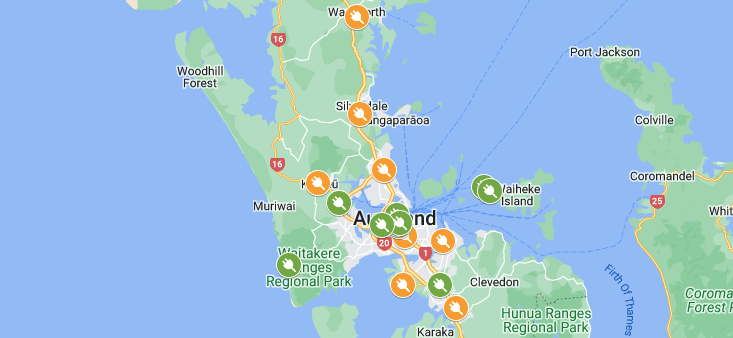
Vector is looking to get rid of its network of Auckland electric vehicle chargers. Selling will shake up the market in our biggest city, not least for EV customers who will have to start paying for power
Vector’s decision to set up a network of free EV charging stations in Auckland has long been controversial. Most customers love it - who doesn’t love free stuff? But as electric car sales have boomed over the past few months (see graph below) there have been complaints about queues, people hogging limited charger spots, and other unsporting EV behaviours.
Meanwhile, having a consumer trust-owned power supplier giving electricity away for free has largely kept other players out of the biggest market in the country.
“It’s as if a petrol company was investing millions in putting service stations in, and then council came along and installed free petrol pumps,” one industry expert told Newsroom. “There’s a question whether Vector should be competing with commercial operations.”
READ MORE * The pain of charging your EV on the go * EV etiquette, EV envy and EV-erything in between
Vector’s decision to divest will change the dynamics. While there is little information available so far on a possible deal, any new owners will undoubtedly charge for charge, so to speak.
“It’s a little too early to give you much detail, but there’s a lot of interest in the chargers and we are in the process of investigating our options,” Vector CEO Simon Mackenzie told Newsroom. “We don’t have a timeframe yet and won’t know the impact until further down the track – it would depend on who acquired the chargers and how they chose to operate them.”
Vector installed its first charger in 2016 as a way both to encourage the uptake of electric vehicles and to find out more about the EV charging market, Mackenzie says. Since then it has built a network of approximately 10 rapid chargers and about the same number of standard ones - see map below.

Who could buy the chargers is unclear, as is how it will work. One complication is that at the moment Vector chargers tend to be on its own land and/or next to its own electricity infrastructure.
Two of the larger players - the biggest ChargeNet, with 280 chargers, and OpenLoop, which brought together the charging networks of WEL and Counties Energy - both told Newsroom they were not in negotiations with Vector.
“Counties Energy and OpenLoop have not received notification from Vector on a potential sale of their electric vehicle chargers at this stage,” spokesperson Jodine Laing told Newsroom. “However this would certainly be an opportunity we would assess if invited to participate in any formal process.”
ChargeNet taking over the Vector chargers is less likely.
While relations between the two companies were initially cordial, it’s an ill-kept industry secret there’s no love lost between them these days.

ChargeNet’s acting CEO Damon Birchfield chooses his words carefully.
“Providing free charging has not been particularly helpful, ultimately, for the Auckland market. It’s very difficult for a normal company that doesn’t have access to the electricity network to be able to provide a comparable service, so that’s held back investment in Auckland.”
Another industry source, who didn’t want to be named, is less circumspect. “At one stage Vector was saying it wanted to start charging EV owners, and was trying to write the software needed to do that. The view in the industry was Vector would rather burn in hell than use Steve’s.”
The ‘Steve’ referred to is ChargeNet co-founder and director Steve West.
Birchfield says charging infrastructure is expensive, and the bigger and faster the charger, the more expensive it is.
“It’s not just the cost of the machine, it’s the whole cost of accessing the grid - the network connection. Fast chargers in particular need access to quite a bit of electricity, so generally you need a new transformer.
“To invest in a hyper-charger-type site, you are in the ballpark when you are talking about half a million dollars.”
While any move by Vector to sell its chargers will be a blow to Auckland consumers accustomed to free charging, not all will be sad to see a more normal market develop, particularly now sales of EVs are skyrocketing, creating more pressure on chargers.

Free, but not fair
“Vector has been a catalyst for making charging available in Auckland,” says Mark Gilbert, chair of Drive Electric, a not-for-profit working to accelerate electric vehicle uptake. “But making it free makes it difficult for others in the market.
“People should be paying for electricity.”
For the average New Zealander, charging an EV costs the equivalent of paying 30-40 cents for a litre of petrol, Gilbert says, which is already a massive discount to the $2.75-$3.00 you are likely to pay for petrol at the pump.

Gilbert says the news Vector wants to sell its chargers is “fantastic”, as long as they remain useable and in the city.
A similar message comes from Kathryn Trounson, chair of the Better NZ Trust, which has been “#LeadingTheCharge [to promote zero carbon technologies]” since January 2015.
“The Auckland situation is skewed badly. We’re seeing people queuing to get free power and sometimes there's a bit of aggro. Because they are free, people sit on the Vector chargers, rather than using their own charger at home. Plus taxis and other commercial vehicles stay on chargers for longer than they should.”
In theory, the Vector chargers have a 30-minute time limit, but that’s neither enforced nor enforceable. Good EV etiquette is to leave a note or log your contact details into an app if you head off for a coffee leaving your vehicle on charge. That means someone waiting for the machine can get in touch. That doesn't always happen.

(For another Newsroom story on problems besetting the on-the-go EV charging network, including a sometimes unwieldy and uncoordinated payments system, see our story The pain of charging your EV on the go.)
Metering also up for sale
The EV charging network is not the only part of Vector potentially up for sale. In April this year the company announced a strategic review of its smart metering data services business Vector Metering, potentially worth $3 billion. In August it said it was inviting proposals for a “significant co-investor".
This week The Australian newspaper reported Vector had delayed the sale process, pushing back the date for final bids to be submitted.







